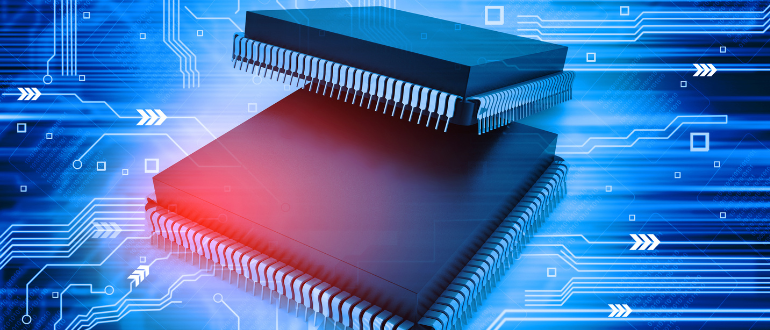
President Donald Trump late Wednesday threatened to slap “approximately 100%” tariffs on imported computer chips, but not on companies that have agreed to start manufacturing microchips in the U.S.
“We’ll be putting a tariff on of approximately 100% on chips and semiconductors, but if you’re building in the United States of America, there’s no charge, even though you’re building and you’re not producing yet,” Trump said during a White House event with Apple Inc. CEO Tim Cook to announce that company’s additional $100 billion commitment to invest in U.S.-based manufacturing. [In February, Apple vowed to spend $500 billion, hire 20,000 workers, and build a factory in Texas over the next four years.]
The tariff exemptions, whose details are vague with no timeline, were initially interpreted by Wall Street investors as beneficial to Apple and other major tech companies with vast resources and clout that have made domestic manufacturing pledges. The exemptions, in essence, will continue to consolidate their market share, analysts said.
Futurum Group CEO Daniel Newman deemed Apple, NVIDIA Corp. and TSMC as “big early winners” of the new semiconductor tariffs policies, and said smaller semi companies will “need to rush to make deals to avoid tariffs.”
Since Trump’s return to the Oval Office in January, Big Tech has collectively committed (in words, at least) about $1.5 trillion to infrastructure-related projects in the U.S. The most audacious commitments have come from Apple and Stargate, a $500 billion data center partnership between OpenAI, SoftBank Group, and Oracle Corp., that has struggled to draw funding. [SoftBank reportedly acquired Foxconn Technology’s electric vehicle plant in Ohio for $375 million to help jump-start the data center project.]
Indeed, in recent years, Intel Corp., Taiwan Semiconductor Manufacturing Company, and Samsung Electronics have announced plans to build semiconductor factories in the U.S. Apple and Texas Instruments are teaming to construct a new plant. Earlier this year, TSMC pledged to expand its investments in the U.S. to $165 billion.
Semiconductors are the latest foreign-made products to face a potential tariff from the president, who has levied or threatened steep tariffs on products such as cars, steel, aluminum, and pharmaceuticals, as well as blanket tariffs on dozens of countries. Trump’s sweeping tariffs are intended to spur U.S. manufacturing, though most economists warn they will lead to higher prices for consumers and slow economic growth.
For now, the U.S. remains dependent on imported computer chips, particularly advanced chips from Taiwan.
To alleviate the situation, former President Joe Biden in 2022 signed the bipartisan CHIPS and Science Act. It offers tens of billions of dollars in tax credits and subsidies to chipmakers that build U.S. factories.

